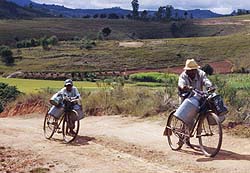2006.06.22: June 22, 2006: Headlines: COS - Ecuador: Service: Bicycles: NGO's: The Star-Ledger : Ecuador RPCV Dave Schweidenback send bicycles overseas with "Pedals for Progress"
Peace Corps Online:
Directory:
Ecuador:
Peace Corps Ecuador :
The Peace Corps in Ecuador:
2006.06.22: June 22, 2006: Headlines: COS - Ecuador: Service: Bicycles: NGO's: The Star-Ledger : Ecuador RPCV Dave Schweidenback send bicycles overseas with "Pedals for Progress"
Ecuador RPCV Dave Schweidenback send bicycles overseas with "Pedals for Progress"

Schweidenback, a 1997 Sargent Shriver Humanitarian Award recipient, and the father of two kids in college, is a red- and silver-haired gearhead who can rattle off all kinds of trivia about American-, Japanese- and English-made bikes and the over-saturated U.S. bike market. He also says it's a simple fact that two wheels and a seat can bring dignity and economic power to people in faraway villages in Nicaragua, Moldova and Namibia.
Ecuador RPCV Dave Schweidenback send bicycles overseas with "Pedals for Progress"
Turning the wheels of change
Thursday, June 22, 2006
BY CHRISTINA JOHNSON
Star-Ledger Staff
The English riders, beat-up Trek hybrids and Barbie-festooned girls' bikes were rolling in, and High Bridge's champion of world improvement was talking about how he could see the wheels go full circle.
"Bicycles in the U.S. have no resale value," said David Schweidenback, sweating and grunting earlier this month as he swiftly cranked a wrench to remove the pedals to flatten a bike for shipping.
The morning sun was already hot, the work being done by Pedals for Progress volunteers at First United Methodist Church of Somerville was gritty, and the cars kept pulling around with once-desired, now unloved, two-wheelers pulled from garages, sheds and porches.
"No one wants a used bike, but we can send this bike to a poor country, where someone will ride it every day for 20 years," he said. "A bike is a way to get to work, to get to school, to get to the health clinic."
Julianna Miller, 12, of Hillsborough looked amazed to hear that her discarded fuchsia bike would turn an African child's two-hour walk to school into a 15-minute ride.
"It makes me glad to know they can get to school quicker," she said.
This weekend, Pedals for Progress is hoping people will donate enough bicycles to put the organization over the 100,000 donations milestone. Schweidenback, a former schoolteacher, home builder and Peace Corps volunteer in Ecuador from 1977 to 1980, takes nearly every bike he's offered, unless it's an abused, rusting hulk. Because Americans use them for pleasure, most come his way in pretty good condition.
"You can tell by the nubs on the wheels, this one's hardly been ridden," he says as he surveys the wheels of an elegant hunter green pre-1970 three-speed Sturmey-Archer, with a basket.
Schweidenback, a 1997 Sargent Shriver Humanitarian Award recipient, and the father of two kids in college, is a red- and silver-haired gearhead who can rattle off all kinds of trivia about American-, Japanese- and English-made bikes and the over-saturated U.S. bike market. He also says it's a simple fact that two wheels and a seat can bring dignity and economic power to people in faraway villages in Nicaragua, Moldova and Namibia.
Recipients purchase the bikes on affordable layaway terms from shops he has set up that are run by local people. Some bikes are transformed into carts, wheelchairs and tourist taxis. He keeps smaller 24-inch kids' bikes especially for Guatemala, because the women are shorter there, he said. Three-speed bikes with fatter tires go to rural areas, where there often are dirt roads and cobblestone streets.
A shy, young boy brought in a rusty Clodhopper II, a beat-up bike that probably had been left outside in the rain too many times.
"It's kind of ugly," Schweidenback said as he started to take it apart. "But if I only stocked brand new bikes, I'd be out of business."
Pedals for Progress also distributes sewing machines. Pedal or electric, they can give a woman paying work, Schweidenback said. "A sewing machine is not just a job, it's a job for life."
A sewing machine wrapped in duct tape and Styrofoam caught the eye of Theresa McCarthy of Raritan Borough in Somerset County. McCarthy brought in a bike but returned home for her 20-year-old Singer in a cabinet, pleased to know it would go to some good use.
"I didn't really make a lot of things, but I mended a lot. Now it's just sitting there, not doing anything," she said as Schweidenback unceremoniously chopped off the legs of the wooden cabinet for shipping and bundled it up.
Donors are asked to bring along $10 per bike or sewing machine to help cover the cost of shipping the items. The real cost is $28, Schweidenback said. In return, they are offered tax-deductible receipts.
The Somerset Hills Kiwanis is sponsoring a collection Saturday from 9 a.m. to noon at the Sunset Inn, 1831 Route 31 in Clinton, Hunterdon County.
For more information, visit the Pedals for Progress Web site at www.p4p.org.
Christina Johnson works in the Somerset County bureau. She may be reached at cjohnson@starledger.com or at (908) 429-9925.
When this story was posted in July 2006, this was on the front page of PCOL:





Peace Corps Online The Independent News Forum serving Returned Peace Corps Volunteers
 | Changing the Face of Hunger
In his new book, Former Congressman Tony Hall (RPCV Thailand) says humanitarian aid is the most potent weapon the United States can deploy against terrorism. An evangelical Christian, he is a big believer in faith-based organizations in the fight against hunger. Members of Congress have recently recommended that Hall be appointed special envoy to Sudan to focus on ending the genocide in Darfur. |
 | PC will not return to East Timor in 2006
Volunteers serving in East Timor have safely left the country as a result of the recent civil unrest and government instability. Latest: The Peace Corps has informed us that at this time, the Peace Corps has no plans to re-enter the country in 2006. The Peace Corps recently sent a letter offering eligible volunteers the opportunity to reinstate their service in another country. |
 | Chris Dodd considers run for the White House
Senator Chris Dodd plans to spend the next six to eight months raising money and reaching out to Democrats around the country to gauge his viability as a candidate. Just how far Dodd can go depends largely on his ability to reach Democrats looking for an alternative to Hillary Clinton. PCOL Comment: Dodd served as a Volunteer in the Dominican Republic and has been one of the strongest supporters of the Peace Corps in Congress. |
 | Vasquez testifies before Senate Committee
Director Vasquez testifies before the Senate Foreign Relations Committee on his nomination as the new Representative to the United Nations Agencies for Food and Agriculture replacing Tony Hall. He has been the third longest serving Peace Corps Director after Loret Ruppe Miller and Sargent Shriver. PCOL Comment: Read our thanks to Director Vasquez for his service to the Peace Corps. |
 | Interview with a Hit Man
RPCV John Perkins says that for many years he was an "economic hit man" in the world of international finance whose primary job was to convince less developed countries to accept multibillion dollar loans for infrastructure projects that left the recipient countries wallowing in debt and highly vulnerable to outside political and commercial interests. In this exclusive interview for "Peace Corps Online," Colombia RPCV Joanne Roll, author of Remember with Honor, talks to Perkins about his Peace Corps service, his relation with the NSA, "colonization" in Ecuador, the consequences of his work, why he decided to speak out, and what his hopes are for change. |
 | Peace Corps stonewalls on FOIA request
The Ashland Daily Tidings reports that Peace Corps has blocked their request for information on the Volkart case. "After the Tidings requested information pertaining to why Volkart was denied the position — on March 2 — the newspaper received a letter from the Peace Corps FOIA officer stating the requested information was protected under an exemption of the act." The Dayton Daily News had similar problems with FOIA requests for their award winning series on Volunteer Safety and Security. |
 | PCOL readership increases 100%
Monthly readership on "Peace Corps Online" has increased in the past twelve months to 350,000 visitors - over eleven thousand every day - a 100% increase since this time last year. Thanks again, RPCVs and Friends of the Peace Corps, for making PCOL your source of information for the Peace Corps community. And thanks for supporting the Peace Corps Library and History of the Peace Corps. Stay tuned, the best is yet to come. |
 | History of the Peace Corps
PCOL is proud to announce that Phase One of the "History of the Peace Corps" is now available online. This installment includes over 5,000 pages of primary source documents from the archives of the Peace Corps including every issue of "Peace Corps News," "Peace Corps Times," "Peace Corps Volunteer," "Action Update," and every annual report of the Peace Corps to Congress since 1961. "Ask Not" is an ongoing project. Read how you can help. |
 | RPCV admits to abuse while in Peace Corps
Timothy Ronald Obert has pleaded guilty to sexually abusing a minor in Costa Rica while serving there as a Peace Corps volunteer. "The Peace Corps has a zero tolerance policy for misconduct that violates the law or standards of conduct established by the Peace Corps," said Peace Corps Director Gaddi H. Vasquez. Could inadequate screening have been partly to blame? Mr. Obert's resume, which he had submitted to the Peace Corps in support of his application to become a Peace Corps Volunteer, showed that he had repeatedly sought and obtained positions working with underprivileged children. Read what RPCVs have to say about this case. |
 | Why blurring the lines puts PCVs in danger
When the National Call to Service legislation was amended to include Peace Corps in December of 2002, this country had not yet invaded Iraq and was not in prolonged military engagement in the Middle East, as it is now. Read the story of how one volunteer spent three years in captivity from 1976 to 1980 as the hostage of a insurrection group in Colombia in Joanne Marie Roll's op-ed on why this legislation may put soldier/PCVs in the same kind of danger. Latest: Read the ongoing dialog on the subject. |
Read the stories and leave your comments.

Some postings on Peace Corps Online are provided to the individual members of this group without permission of the copyright owner for the non-profit purposes of criticism, comment, education, scholarship, and research under the "Fair Use" provisions of U.S. Government copyright laws and they may not be distributed further without permission of the copyright owner. Peace Corps Online does not vouch for the accuracy of the content of the postings, which is the sole responsibility of the copyright holder.
Story Source: The Star-Ledger
This story has been posted in the following forums: : Headlines; COS - Ecuador; Service; Bicycles; NGO's
PCOL33199
70
























